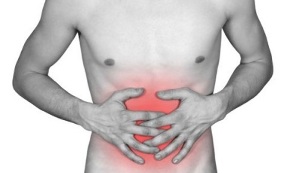
Intestinal worms can occur in humans in different ways. The most common routes of infection are contact with an infected animal or consumption of underprocessed food. Nobody is immune to infection. Worm infestation (damage to the body with tape, round and flat worms) leads to poor health and, in some cases, serious complications. The problem must be fought.
Modern medicines allow you to remove worms from the small intestine and from the large intestine to stop their negative effects on the gastrointestinal tract. Knowing how to try to protect yourself from infection is very important.
Causes of the helminthic invasion
The causative agents of the invasion are worms living in the intestine, which can be of various types. They invade the body and over time, intestinal parasites keep increasing. These organisms take root in the human body, multiply in it and feed on substances that enter the body. Due to their fault, a person can get less important nutrients: proteins, fats and carbohydrates, trace elements, vitamins. During the invasion, pathogens pass from the larval stage to full-fledged worms, which seriously affect the condition of the body. Parasites live in the human intestine for a long time and do not go away without therapy.
You can be infected with worms in the following ways:
- By eating.Worms are often found on the surface of unwashed vegetables and fruits. Some types of parasites (beef and pork tapeworms) leave larvae in the meat. If it is not fried, the larvae will move into the human body and begin to develop there.
- Contact household path. If a person touches door handles in public places, handrails and other elements without considering hygienic skills, there is a risk of invasion. The contact method spreads the disease through a handshake with an infected person, and the household method is infection through dirty dishes or other household items.
- About pets.Some types of parasites in the rectum use four-legged friends as intermediate hosts. The larvae are transmitted through contact with the pet. This can be done with hugs, with an unexpected "kiss". A dog can get roundworm eggs on its paws by picking them off the ground outside.
With parasites in the intestine, the symptoms and causes of the disease can be different. The main reason behind the onset of infection is inadequate hygiene. With proper personal hygiene, regular hand washing and handling of fresh food, the risk of infection is drastically reduced.
Types of worms
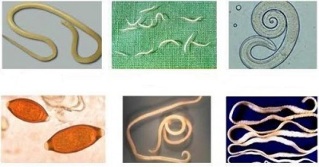
Which parasites live in the intestine? The body does not become infected with one or two, but with different types of worms. They can coexist in the intestine at the same time, but more often worms are found separately in humans.
The main classification of worms is based on their appearance. The parasites are intestinal, the symptoms are similar.
Important!Only a doctor can determine what type of worm has affected the gastrointestinal tract. You cannot try to define the disease yourself.
There are three main types of worms:
- tape;
- flat;
- are round.
Tapeworms in the intestine have a segmented body and a semi-flat shape, which is why helminths got their name (see photo). Round parasites in the human intestine look the closest to a normal earthworm. They are translucent and have a white or colorless body through which the main vessel shines. Flatworms are usually oval and sometimes slightly segmented. Each length can be anywhere from 10 mm to 10 meters. There are many different parasites in the small intestine, some of which are much smaller.
Experts identify more than 10 types of helminth invasion that are due to different pathogens. The most common type is ascariasis, that is, an infection with 15 to 40 cm long roundworms with characteristic abdominal pain and poisoning. But there are also other options:
- Trichocephalosis.The pathogen is the whipworm. Vlasoglav is one of the most versatile worms. It penetrates the appendix tissue as well as the large and small intestines. The main symptoms are dizziness, vomiting, nausea, and other signs of worms and poisoning. Parasites that live in the small intestine can be easily removed with medication.
- Teniarinhoz.This is the development of the beef tapeworm in the human body. This worm is transmitted through meat products and large pets. As a result, there is constant poisoning of the body and pain in the abdominal cavity.
- metagonimosis.One of the most dangerous forms of parasites in the human intestine that needs urgent removal. It is caused by flukes, which can cause bowel inflammation. The infection occurs through untreated fish.
- Trichinellosis.The most severe form that leads to the death of the patient with prolonged absence from therapy. The Trichinella pathogen can penetrate the intestines into the internal organs and seriously disrupt their work. Due to the increased activity of the parasite, pain can be felt not only in the abdomen, but also in the muscles. Conjunctivitis begins as an allergic reaction.
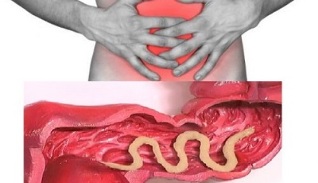
There are more than a dozen variations of worms and the groups of diseases they cause - 10. Even specialists find it difficult to distinguish from one another, so you should not make a diagnosis yourself. This will only lead to inadequate therapy and an increase in negative symptoms. Only a highly qualified doctor with special equipment can correctly identify the type of helminth, since intestinal parasites have similar symptoms (teniarchosis and trichocephalosis are difficult to distinguish).
Consequences of the helminthic invasion
In the case of a long absence from treatment, various complications are possible. The kidneys, biliary tract, and some internal organs are affected. Even the heart and brain are at risk if the symptoms of dangerous parasites in the gut are not noticed in time.
Watch out!If you suspect a severe helminth invasion with damage to the internal organs, contact a specialist immediately. The parasite can be fatal at any time if the case is neglected. Symptoms and treatment should be monitored by a doctor.
The main complication of advanced helminthic invasion is withdrawal symptoms. This is a state of constant intoxication. The patient feels weak, cannot be active, suffers from vomiting and dizziness. Such signs disappear only with the complete removal of the parasite from the body.
During the research, other consequences of infection were also identified:
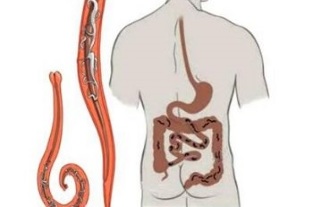
- the skin becomes significantly thinner, covered with virus growth (papillomas), takes on an unhealthy color;
- Due to the developing vitamin deficiency, hair and nails become thinner and break, bones become more fragile.
- the person feels drowsy all the time;
- Changes in the nervous system can make the infected person more aggressive.
- In severe cases, the invasion is fatal.
Death is likely if the problem is ignored for several years. During this time, the helminths have time to grow to a significant size and begin to actively eat nutrients, as a result of which they are almost completely taken away from humans.
Symptoms of the invasion
The helminth invasion manifests itself in the early stages of development. The longer the parasite is in a developmental state, the more pronounced the symptoms of worms in humans.
There are a number of non-specific signs that do not distinguish the invasion of other diseases. The symptoms of parasites in the intestines are varied. The most common are the following:
- nausea;
- vomiting;
- feel tired;
- dizziness;
- unconsciousness;
- gastrointestinal disorders;
- rectal inflammation;
- constipation.
One specific symptom that is rarely seen in other conditions is wandering abdominal pain. It "goes" through the intestines while pricking several places at the same time. The reason is the movement and activity of parasites. Parasites in the gut show symptoms of intoxication or poisoning, making the disease difficult to diagnose.
Diagnosis of a disease
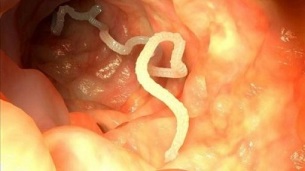
The disease must first be differentiated from similar gastrointestinal problems. It is necessary to distinguish it from ordinary poisoning, infection and appendicitis. The differentiation is based on data from the anamnesis. For more accurate results, it is recommended to additionally check the worm type.
How do I know if there are parasites? You can determine the exact type of parasite by using the stool analysis. The parasites that live in the human colon secrete eggs, which are released with the feces. In it, experts find worm eggs and determine what type of parasite they belong to. Based on the data obtained, treatment is carried out.
Tip:Go to a specialist with a pre-made stool analysis. To maximize the speed of the procedure, order a check from a paid medical center. That way, you can get information about your diagnosis and worms as soon as possible.
During the diagnosis, an anamnesis is recorded, an irrigoscopy is performed and the abdominal region is scanned. The latter allows you to assess the degree of damage to the body. If there are serious deviations, a person can be sent for additional examinations. There they find out how dangerous damage to the internal organs is and whether it is even present. After that, therapy is prescribed, the main function of which is to cleanse the intestines at home. You can also determine the diagnosis with a colonoscopy.
Therapy progress
How do I remove parasites? You need to clean your colon at home. The infection is treated by killing the parasites. To fight them, special preparations for parasites are used.
The choice of drug against parasites in the intestine should be based on the type of worm. Most drugs are complex pills, that is, you can fight against Ascaris, as well as flatworms and tapeworms. Medicines work slightly differently.
Terms for removing worms

Taking medication usually only takes a day or two for the body to fully recover. Many of the antihelminthics are enough to use once, a maximum of - twice.
However, this rule applies only to specialty drugs, after which the symptoms of worms in adults disappear almost instantly. Dietary supplements are taken at different intervals.
Dietary supplements are effective when taken for about a month. The optimal course duration is one and a half months. Then a break of at least two months is taken, if necessary, the drug is taken again after this time.
Both biologically active additives and special drugs can be used repeatedly. However, with repeated use, you should definitely consult a doctor. Treatment of parasites with folk remedies is not recommended.
Prevention of infections
Worm infestation can easily be avoided with simple hygiene practices. First, experts recommend limiting contact with untested animals and improving food hygiene. Vegetables, fruits, herbs and other products need to be washed. Helminth larvae that are invisible to the human eye can be found on their surface. When frying, the meat must be brought to a ready state, while possible parasites must be killed.
It is important to follow the basic rules of personal hygiene:
- The brush used to clean the teeth must be separate for each.
- the same goes for body towels;
- After eating, the dishes must be washed for you or your household.
- cannot eat from someone else's dirty plate.
- Hands should be washed after going outdoors, handling pets and before eating.

If you follow the basic rules, you can forget about the problem of invasion forever. Prophylactic formulations can be considered a guarantee of health. Before buying any herbal dietary supplement that will constantly protect the body, it is necessary to consult your doctor.
Cleansing the intestines from worms is an extremely important process for the health and well-being of the patient. People who have parasites in their bodies cannot live fully.
It is also useful to cleanse the body for preventive purposes: you can also use cleansing techniques to remove toxins. With timely therapy, helminthic invasion is not dangerous.





























